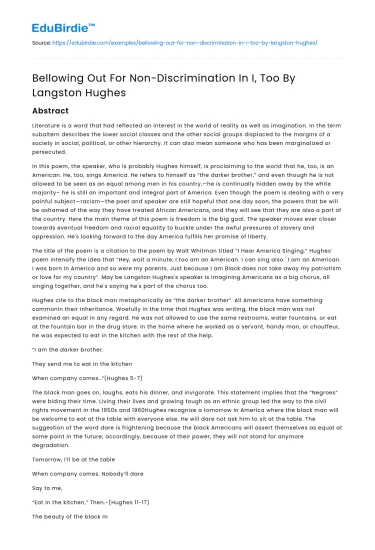Abstract
Literature is a word that had reflected an interest in the world of reality as well as imagination. In the term subaltern describes the lower social classes and the other social groups displaced to the margins of a society in social, political, or other hierarchy. It can also mean someone who has been marginalized or persecuted.
In this poem, the speaker, who is probably Hughes himself, is proclaiming to the world that he, too, is an American. He, too, sings America. He refers to himself as “the darker brother,” and even though he is not allowed to be seen as an equal among men in his country,—he is continually hidden away by the white majority– he is still an important and integral part of America. Even though the poem is dealing with a very painful subject—racism—the poet and speaker are still hopeful that one day soon, the powers that be will be ashamed of the way they have treated African Americans, and they will see that they are also a part of the country. Here the main theme of this poem is freedom is the big goal. The speaker moves ever closer towards eventual freedom and racial equality to buckle under the awful pressures of slavery and oppression. He's looking forward to the day America fulfills her promise of liberty.
Save your time!
We can take care of your essay
- Proper editing and formatting
- Free revision, title page, and bibliography
- Flexible prices and money-back guarantee
The title of the poem is a citation to the poem by Walt Whitman titled “I Hear America Singing.” Hughes’ poem intensify the idea that “Hey, wait a minute, I too am an American. I can sing also.' I am an American. I was born in America and so were my parents. Just because I am Black does not take away my patriotism or love for my country”. May be Langston Hughes's speaker is imagining Americans as a big chorus, all singing together, and he's saying he's part of the chorus too.
Hughes cite to the black man metaphorically as “the darker brother”. All Americans have something commonin their inheritance. Woefully in the time that Hughes was writing, the black man was not examined an equal in any regard. He was not allowed to use the same restrooms, water fountains, or eat at the fountain bar in the drug store. In the home where he worked as a servant, handy man, or chauffeur, he was expected to eat in the kitchen with the rest of the help.
“I am the darker brother.
They send me to eat in the kitchen
When company comes…”(Hughes 5-7)
The black man goes on, laughs, eats his dinner, and invigorate. This statement implies that the “Negroes” were biding their time. Living their lives and growing tough as an ethnic group led the way to the civil rights movement in the 1950s and 1960Hughes recognize a tomorrow in America where the black man will be welcome to eat at the table with everyone else. He will dare not ask him to sit at the table. The suggestion of the word dare is frightening because the black Americans will assert themselves as equal at some point in the future; accordingly, because of their power, they will not stand for anymore degradation.
Tomorrow, I’ll be at the table
When company comes. Nobody’ll dare
Say to me,
“Eat in the kitchen,” Then.-(Hughes 11-17)
The beauty of the black man is not just the outward appearance. It is the quality of his character. To Hughes and black Americans, the only difference between the white man and the black man was the color of the skin—not his intelligence, his personality, his character, or anything else. If given the same freedom and equality, the black man would rise above his circumstances just as the white man has.
To strengthen his idea, the poet ends with the motivation of the entire poem: “I, too, am America.” What a powerful statement for a black man in the era in which it was written! Hughes powerfully proves with his wonderful voicing and innovation that it took too long for the black man to be accepted as an authentic American.
References
- I, too by Langston Hughes
- https://www.shmoop.com/sympathy/summary.html
- https://en.wikipedia.org/wiki/Subaltern_Studies
- https://www.poetryfoundation.org/poems/46459/sympathy-56d22658afbc0






 Stuck on your essay?
Stuck on your essay?

